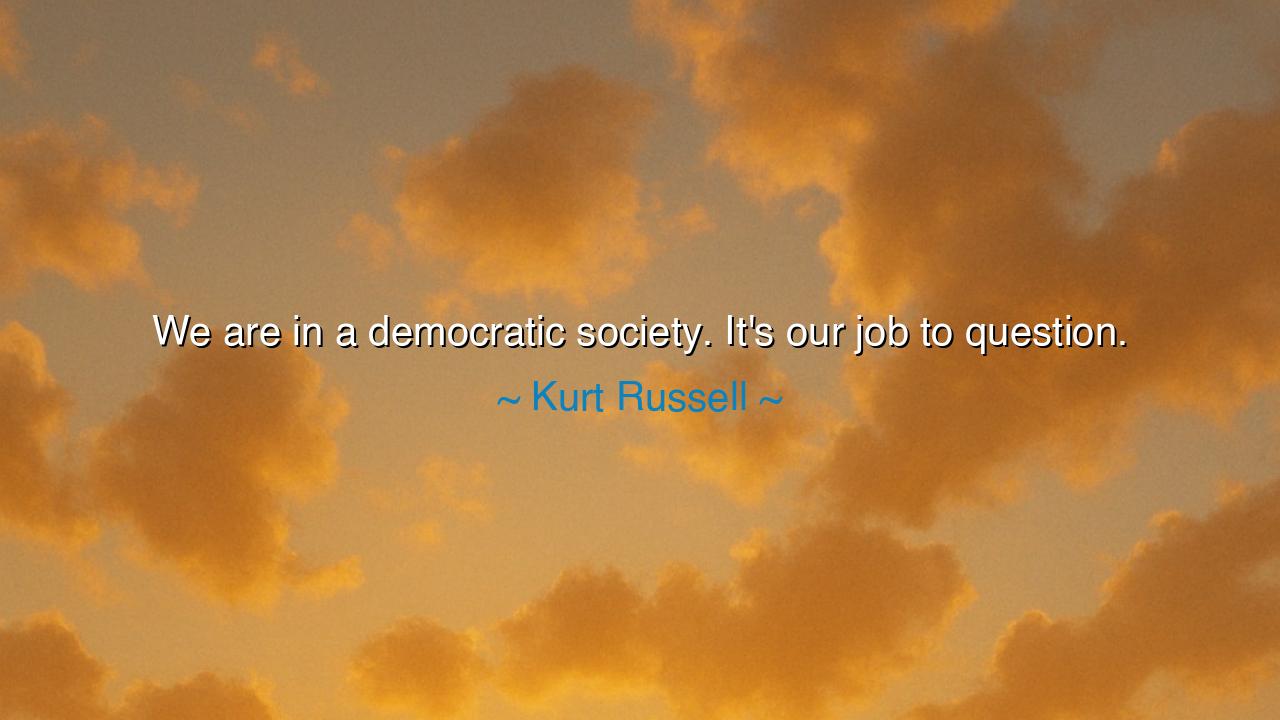
We are in a democratic society. It's our job to question.






"We are in a democratic society. It's our job to question." These powerful words from Kurt Russell echo across the ages like a clarion call to the hearts and minds of all those who cherish the freedom to think, to question, and to act. Democracy, in its most noble form, is not merely a system of government but a commitment to the unfettered pursuit of truth, to the courage to challenge the status quo, and to the belief that every individual has the right—and the duty—to question the world around them. It is a society built not on unquestioning obedience but on the strength of inquiry and the power of critical thought.
In the ancient world, Socrates, the father of Western philosophy, embodied this very essence of democratic questioning. He was the great questioner, the one who wandered through the streets of Athens, asking the citizens to examine their lives, to question their beliefs, and to strive for a deeper understanding of virtue and truth. Socrates believed that unquestioning acceptance was the greatest danger to a society, for only through questioning could wisdom be found. His life and death are a testament to the power of inquiry—a power so potent that it threatened the very foundation of Athenian society. For his troubles, he was sentenced to death, but even in his final moments, he did not cease to question, to challenge, and to seek the truth.
This is the heart of democracy: freedom to question. It is not simply a matter of casting a vote every few years; it is about challenging authority, examining power, and always striving to understand whether the leaders we have chosen, the laws we abide by, and the systems that govern us are just, fair, and true. Russell's words remind us that, in a democratic society, the true measure of our freedom is not how easily we accept the world as it is, but how willing we are to ask difficult questions, to confront injustice, and to seek answers even when they are uncomfortable.
Consider the example of Martin Luther King Jr., whose life was defined by his refusal to accept the racial inequalities that permeated the American South. At a time when the vast majority of society seemed content to maintain the oppressive systems of segregation and discrimination, King stood as a beacon of resistance, questioning the moral foundations of the law. He asked the question: “Why must we, as human beings, continue to accept injustice simply because it is the status quo?” His questioning led to one of the most profound social movements in history, one that shifted the very moral compass of a nation. King’s life was a testament to the power of questioning, of demanding more from society, and in doing so, transforming the world.
Yet, the act of questioning is not always easy. It demands courage. It demands that we speak truth to power, even when it is inconvenient, even when it may cost us comfort or security. Gandhi understood this deeply, as he led a nonviolent revolution against British colonial rule in India. His method was one of questioning the injustice of empire, not with arms but with peaceful resistance and civil disobedience. His courage in the face of overwhelming oppression showed that the act of questioning is itself a form of revolution—one that can topple the mightiest of empires. The lesson is clear: in a democratic society, questioning is not a privilege for the few, but a duty for all. It is the engine of progress, the force that propels us toward greater justice and truth.
But the question must not only be directed outward, toward others and the systems we live within—it must also be directed inward. Self-examination is the foundation of democracy. Plato taught that true wisdom comes from the constant questioning of one's own beliefs, motives, and actions. A society that fosters self-questioning produces individuals who are not easily swayed by propaganda or false narratives. They are free to think for themselves, to challenge the world around them, and to shape it in ways that reflect their highest values. The individual who questions, who refuses to accept the world as it is, becomes the catalyst for change—not just in society, but in their own life as well.
So, let us take Russell’s words to heart: in our democratic society, it is our duty—not just a right—to question. To question the systems that hold power, to question the truths we’ve been told, and to question the very way we live and interact with one another. But let us also remember that questioning must be done with a spirit of humility and respect. The goal is not to tear down for the sake of destruction, but to build a more just, more equitable world. Democracy, at its best, is a dialogue—a constant exchange of ideas, a search for truth, and a refusal to accept the world as it is when it could be better.
In our own lives, let us take up the mantle of Socrates, of King, of Gandhi, and of all those who have stood in defiance of injustice through their questions. Let us be brave enough to question not just the world, but ourselves. Only through questioning can we unlock the path to a better society, a society where the voices of the many are heard, and the truth is sought by all.






AAdministratorAdministrator
Welcome, honored guests. Please leave a comment, we will respond soon